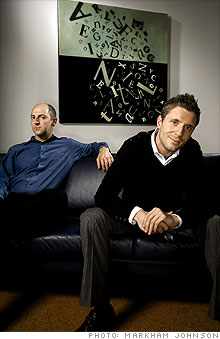| FORTUNE Small Business | |
| Next Little Thing 2008 |
|
The next search frontier: Just ask your question
Powerset aims to top Google by teaching computers to understand English.
 |
| Pell and Thione search for success at Powerset's office. |
SAN FRANCISCO (Fortune Small Business) -- "What would a computer do if it could read?" muses Barney Pell, 40, as he stares at a large screen in his San Francisco startup.
The question lies at the core of his business. Of Pell's 62 employees, 20 have Ph.D.s, divided almost evenly between linguistics and software engineering. Their job: making software that not only searches the Web but understands everything written there.
Welcome to Powerset, a three-year-old company working on what co-founder Pell calls a 20-year project: natural language search, or NLS. Search engines such as Google (GOOG, Fortune 500) require you to type in keywords. Powerset is betting that users would rather type questions in plain English. Pell also hopes to prove that it can produce more relevant ads than Google - and enter the $25-billion-a-year market for online advertising.
The idea of NLS is not new. IAC (IACI, Fortune 500)'s Ask.com and Microsoft (MSFT, Fortune 500) have offered search engines programmed to understand basic questions, with mixed results. But Powerset's program is much more ambitious: It also parses the grammar and syntax of each page it searches, meaning it can spot more relevant answers.
Powerset's main asset is a partnership with PARC, the Palo Alto research center that incubated the computer mouse and the laser printer. In 2005, Pell discovered that PARC researchers had been working for 30 years on turning English into software code. Pell promptly licensed PARC's research and hired the top scientists in the field, starting with Powerset co-founder Lorenzo Thione.
That caused a snowball effect as engineers interested in NLS left Google, Yahoo (YHOO, Fortune 500), and Ask to join Powerset.
"If you hire the brightest people you know, they bring their brightest friends," says Thione. The company recruited entirely by word of mouth.
Powerset's first offering, launched in May, is limited to searching Wikipedia. But in the next year the company plans to begin searching major news websites and blogs. At the same time, it hopes to start a modest revenue stream by selling targeted ads against its search results. If Google can make billions from keyword ads, the thinking goes, ads that truly understand your query and its answer could be even more valuable.
NLS is still in its infancy. Pell compares Powerset's current software to the mind of a 2-year-old child. Some critics doubt that it is even necessary. Danny Sullivan, founder of industry blog Searchenginewatch.com, argues that consumers are happy to use keywords because the average search consists of just a couple of words.
Pell counters that many users have trouble framing keywords that will unearth the information they seek.
"My mom has no idea how keyword searches work," he says, "but she can ask questions." ![]()
8 big ideas to watch in '08
Next Little Thing: Plug in that bike
Boosting teamwork with wikis
-
The Cheesecake Factory created smaller portions to survive the downturn. Play
-
A breeder of award-winning marijuana seeds is following the money and heading to the U.S. More
-
Most small businesses die within five years, but Amish businesses have a survival rate north of 90%. More
-
The 10 most popular franchise brands over the past decade -- and their failure rates. More
-
These firms are the last left in America making iconic products now in their twilight. More








